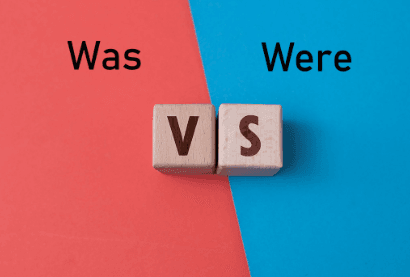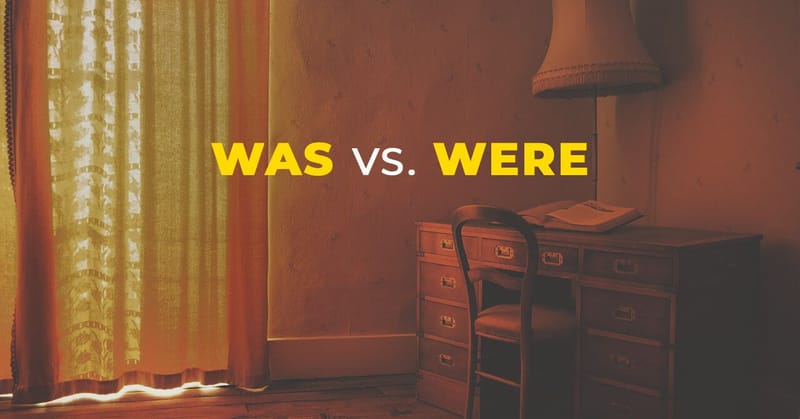Was vs Were: Gaining Insight into the Proper Use and Application
Contents

Welcome to the fascinating world of English grammar. In this world, understanding the correct usage of words like was vs were helps in refining your language skills. This might seem like a small difference. But it can significantly impact your sentence construction and meaning. It's also not about knowing grammatical rules alone. It is about confidently using them in everyday conversations.
In this guide, we will discuss the usage of was vs were in detail. We will back this with practical examples and clear explanations. This guide is specifically designed for non-native English speakers in India. We promise to make this journey engaging and relatable for you. So let's get started!
Understanding 'Was' and 'Was': The Grammar Rules
Let's start with the basics. Both 'was' and 'were' represent the past tense in English. But, their usage is determined by the singularity or plurality of the subject they are used with.
Let's take you back to the basics of English grammar, focusing on the usage of 'was' and 'were'. Firstly, we must understand what these words represent. Simply put, 'was' is a past tense verb that we use with singular subjects. Consider this example: "Ravi was at the cricket match yesterday." Here, 'Ravi' is a singular subject and so we use 'was'.
'Was' is used for all singular subjects. For example, "I was at a cricket match yesterday." Here, 'I', being a single individual, is coupled with 'was'. Other instances where we use 'was' include sentences like:
He was late for school.
Shreya was excited about her trip to Goa.
It was a sunny day.
'Were' is used for plural subjects or when paired with 'you'. For more than one entity like 'they', we use 'were'. Let's look at some examples:
We were playing football.
They were on vacation last week.
You were very helpful.
As mentioned, 'were' is also used with 'you.' For instance, "You were always fond of Bollywood music." In this case, whether you're addressing one person or several, you use ‘were’.
In summary, here's a simple table to help you decide whether to use ‘was’ or ‘were’:
Subject | Correct Verb | Example |
I | Was | I was eating. |
He/She/It | Was | She was studying. |
You | Were | You were sleeping when I came home. |
We/They | Were | They are playing hockey. |
Was vs Were in Questions & Negative Sentences
It is equally important to understand the guidelines for the use of was vs were in questions and negative sentences. Let's take a look at the was vs were rules for these:
When you're framing questions, 'was' and 'were' are used at the beginning of yes/no questions. 'Was' is used with singular nouns or pronouns (like he, she, it). 'Were' pairs with plural subjects (like we, you, they). For example:
"Was Raj at the cricket match yesterday?"
"Were the Sharma sisters at the party last night?"
In negative sentences, 'was not' or 'wasn’t' is used with singular subjects and 'were not' or ‘weren’t’ with plural ones. Here are some examples:
"She wasn't at the meeting."
"They weren't satisfied with the proposal."
"Wasn't he supposed to call you back?"
"Weren’t we going to the film festival?"
Remember these simple rules when framing your next question or constructing a negative sentence! Understanding the use of was vs. were in sentences with different structures can truly improve your English skills!
Understanding the Subjunctive Mood

In English grammar, there's a special case where 'were' is favoured over 'was'. This is known as the subjunctive mood. It's used to express hypothetical or unreal conditions, desires, or suggestions.
It might sound complex but don’t worry. Let's understand it through examples.
If I were rich, I'd buy a house in Mumbai.
She would travel the world if she were not afraid of flying.
If he were taller, he could have been a basketball player.
In these scenarios, we're talking about single individuals (which usually requires 'was'). But we use 'were' because the situations are unreal or hypothetical. So remember, when expressing a wish or an unreal situation, use 'were', even for singular subjects.
Practical Exercises for Mastering Was vs Were
Let’s put your understanding of was vs were usage to the test. Below are five fill-in-the-blank questions. Try to insert the right form – 'was' or 'were'.
She ___ in Delhi last week.
If I ___ a dog, I would be happy all day.
I ___ not expecting them to come.
We ___ wondering if you'd like to join us for dinner.
You ___ there, weren’t you?
Answers:
was
were
was
were
were
Each question shows a typical usage example for was and were. They are designed to help you get comfortable with their usage in different contexts and sentences.
Don't worry if you didn't get all of them right; language learning is a journey! Clapingo's personalised coaching sessions can help you master such rules of English grammar. This includes was vs were rules and more.
Looking for more practice material? Don't miss Clapingo's compilation of Top 25 English Speaking Course Books You Shouldn't Miss. These books also include exercises on the use of was vs were in sentences. Keep practising, and soon you'll be using 'was' and 'were' effortlessly!
Final Thoughts
In this blog post, we've explained the differences between 'was' and 'were'. We've seen that 'was' is used with singular subjects. 'Were' appears with plural subjects, 'you' or hypothetical situations. Remember, becoming skilled in these details requires practice and time.
It is normal for non-native English speakers to find understanding these rules challenging. The expert tutors at Clapingo understand this difficulty. So, Clapingo's personalised coaching sessions are designed to assist you in mastering these rules. Achieving language fluency takes time, but with consistent effort, it's absolutely possible.
Keep practising and learning! Each day brings you closer to mastering the use of 'was' and 'were' and improving your spoken English. Keep in mind that progress in language isn't about quick success but steady improvement. Every step forward is a victory.
FAQs
1. When to use was vs were?
Use 'was' when talking about singular subjects in the past tense, except for the pronoun 'I'. Use 'were' for plural subjects and with 'I'.
2. Should I say I was or I were?
Generally, use 'I was'. But in hypothetical situations, use 'I were'. For example, "I wish I were a billionaire".
3. Can I say if I were you?
Yes, it's correct and common to use "If I were you." It is used when giving advice about what you would do in the other person's situation.
Comments
Your comment has been submitted